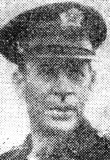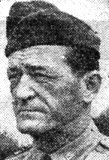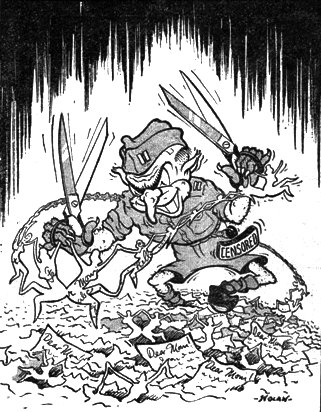
VOL. I NO. 29 REG NO. L5015 DELHI, THURSDAY APRIL 1, 1943.
Theater Air Chiefs For Major Generals WASHINGTON - President Roosevelt has sent to the Senate for confirmation the nominations of Brig. Gen. Clayton Bissell, 10th Air Force chief, and Brig. Gen. Claire Chennault, commander of the newly-formed 14th Air Force, to be major generals.
Included in the President's nominations for general officers is Col. William E. Bergin, Theater G-1, for the rank of brigadier general. |
War Reporter Relates Heaviest American Raid Against Burma
WITH U.S. MEDIUM BOMBERS OVER MANDALAY AREA - (Delayed) - The Japanese, who were stubbornly defending Myitnge Bridge, got the surprise of their lives last month but few, if any, are probably now living to tell about it.
The largest formation of U.S. medium bombers ever assembled over a single target area in Burma wiped out ack-ack batteries surrounding a bridge six miles south of Mandalay, then followed through with what appeared to be several direct hits on a span and nearby installations.
It was the greatest exhibition of mass bombing that I have been privileged to witness during the past six months in the Middle East and in the Theater. It climaxed a dramatic two-day series of raids on the repeatedly-bombed bridge, one of the most important targets in Burma, because it is located on the vital railway connecting Rangoon, Mandalay and Lashio.
All of our planes returned safely. Our total damage consisted of two small ack-ack holes in one plane.
"We blew the living hell out of them," declared Maj. James Philpott, 30-year-old former TWA airline test pilot, who led the formations. "It was a perfect day for bombing and our bombardiers didn't miss any chance," the major added.
Philpott heads the "Skull and Wings," the roughest, toughest, fightingest guys I ever saw. Most of the "Skull and Wings" pilots are former pursuit pilots and fly bombers like pursuits.
The day before the raid we had a brisk warm-up session. I was in a bomber manned by Lt. Austin Russell, 23, of Thomasville, N.C., as pilot; Lt. Paul Green, 24, Decatur, Ill., co-pilot; Lt. Chester Severin, 25, Cleveland, O., navigator-bombardier; S/Sgt. Horace Staples, 21, Belfast, Me., radio operator-gunner; T/Sgt. Samuel Sackett, 23, Endicott, N.Y., engineer-gunner.
The Japs started a smoke screen as we approached, but the screen was woefully ineffective. We dropped large-caliber bombs which barely missed the span, but hit the approaches. One blew the ack-ack battery to bits.
The bridge is a bombardier's nightmare. Less than 15 feet wide, it resembles a toothpick from the air.
As we swung from the target, acres of ack-ack appeared behind and beneath us, rocking our plane gently as a mother does a cradle. There were more ack-ack puffs. Some seemed as big as airplanes.
I rode in the lead plane with Philpott.
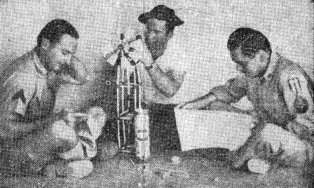 Pity the sad plight of these fellows, serving at a West India station hospital - no service club, library,
movies or other means of recreation.
Recently Corp. Carl J. Mohr (left) received a box of Tinker Toys from his very
understanding sister back home. Mohr shares them with his pals,
Corp Lloyd Palmer and T/4 Zmija, and now they
pass the time by building everything in the instruction sheets, plus their own inventions.
Pity the sad plight of these fellows, serving at a West India station hospital - no service club, library,
movies or other means of recreation.
Recently Corp. Carl J. Mohr (left) received a box of Tinker Toys from his very
understanding sister back home. Mohr shares them with his pals,
Corp Lloyd Palmer and T/4 Zmija, and now they
pass the time by building everything in the instruction sheets, plus their own inventions.
|
The big show occurred the next day when several bombers augmented "Skull and Wings."
I rode in the lead plane with Philpott. His crewmen were: Sgt. Hugh Roper, 21, of Baltimore, co-pilot, one of the few flying officers holding that rank, but due for promotion soon; Lt. W. X. Zeidler, 27, of Chicago, navigator; S/Sgt. W. W. Henry, 25, Oklahoma City, engineer-gunner; Sgt. H. W. Rawlings, 27, Hopewell, Va., radio operator-gunner; Lt. R. L. Ryder, 22, Alexandria, La., bombardier.
"That ack-ack yesterday made us mad," Philpott said, "We'll fix 'em today." I looked back and our formation was so perfect that our planes seemed to be held together by invisible cable. The bombing a few seconds later was also faultless. The Japs apparently got little warning. The had barely started ack-acking us when tons of high explosives poured from the bellies of our planes like dimes from a slot machine when the jackpot is hit.
Smoke, covering every inch of the huge target area, shot skyward in gigantic mushroom shapes. Then there were more waves of bombers loaded with big stuff which was disgorged quickly.
I hurried from window to window. No ack-ack nor enemy aircraft anywhere in the sky.
Philpott yelled as we headed home: "I told you so."
Pilot Rescued As P-40’s Hold Off Japanese
The thrilling details of the rescue of a pilot of the 14th Air Force by the heroism of a pilot of the 10th Air Force, backed by coordinated air protection of his brother officers, were announced by 10th Air Force Headquarters.
With five bullet holes in his P-40 caused by enemy ground fire during a strafing mission. Capt. Charles H. Colwell was flying back to kis base when he noted another P-40 had apparently force-landed within a short distance of a Japanese military headquarters in Burma.
Diving down to confirm his discovery, Colwell saw the pilot still in the cockpit, apparently conscious. He at once notified Fighter Group headquarters by radio. Group headquarters ordered Colwell to remain over the grounded plane until reinforcements could take over protection of the plane and pilot while plans were made for the rescue. Four P-40s which were in the air were at once dispatched to relieve Colwell's damaged plane and, due to the discoverer's remaining over the downed aircraft, the relief patrol lost no time in finding the spot.
Meanwhile, an additional four P-40s were sent to the area to maintain continuous protection, and a transport plane was loaded with gasoline in tins attached to parachutes in the event that the grounded fighter had merely run out of gas.
Back at an Assam base Lt. Ira M. Sussky volunteered to attempt the rescue of the pilot in the PT-17 trainer biplane, a type which already has rescued three other pilots from the Naga jungle in distress. The protective patrol had served to excite the enemy, and the only protection provided the unarmed rescue plane was that of the fighters overhead. Susky landed on rough terrain made worse by elephant tracks and wallows of water buffalo.
He found unharmed by the downed P-40 Lt. Melvin Kimball. He had been forced down by engine failure while flying from a base of the 14th Air Force to India.
Japanese soon began firing on the rescue plane and the two pilots from ambush while they strove to take off. Under this fire, the two officers were obliged to climb from their plane no less than eight times as the rough terrain prevented gaining takeoff speed. Each time they were obliged to chop away stumps or dig out the wheels from bogs which could not be extricated even with full power by a single pilot in the machine. Neither of the men were touched by the enemy fire, but the rescue plane was repeatedly hit. Only because of the protection provided by the fighters above were the enemy soldiers prevented from getting close enough to make their marksmanship fatal. On the ninth effort to take-off as dusk fell the rescuer and recued pilot got into the air.
The fighters then strafed the damaged P-40, which had landed with wheels up to deny its use to the enemy.
Sussky and Kimball landed at an Assam air base in darkness, after the hazardous flight back over the mountainous jungle almost out of gasoline.
GOOD NEWS FOR ALL
There will be two-month furloughs for all officers and enlisted men of this theater during the summer months, it was announced by Theater Headquarters today.
Special fleets of four-motored transport planes, complete with upholstered chairs for enlisted men and bunks for officers, will be flown out to transport CBI personnel back to the States. At each stop along the route women will be available for dancing and free liquor will be furnished by a government grateful to all for sweating it out here in Asia.
Meanwhile several transport loads of WAACS, all under 25 years of age, will be en route guarded by a heavy convoy. This group will be transferred to permanent stations within the Theater and prepared to greet our troops upon their return.
Henceforth enlisted men will be permitted to censor their own mail and the onus of "spot censorship" will be removed. Gifts will be allowed from the United States, including bourbon whiskey, and will be flown our air priority for distribution throughout the Theater.
Per diem will become universal at $17 per day. All tables of organization will be suspended for the duration permitting all officers to immediately attain the rank of colonel while all enlisted men will become master sergeants. Ninety percent of all enlisted men will be permitted to become officers with the rank of captain.
The Roundup will enlarge to 16 pages, be published daily and will insult at least one general officer each week.
Check your calendar, chums, it's April 1!
|
TONGUE TWISTERS
Pity the 1st Sergeant who has to call out the names of these five fellows, newly arrived in this Theater. The general pronunciation of each can be achieved by the use of a heavily-muted, polysyllabic sneeze. The names: Sgts. Raymond C. Andruszkiewicz, Mitchell Wojciechowski, James C. Schlegelmilch, Pfcs. Wassil Szlachlionshyam, Jr., Bernard L. Vannieuwenhoven and Stanley J. Wojciechowski. |
|
WE ALWAYS WEAR PANTS OURSELVES
We don't know how we missed it all this time but both the 10th Air Force and SOS issued identical uniform regulations months ago. The regulations, which have been neither rescinded nor amended, have one extremely enlightening paragraph - to wit: "Officers and warrant officers may wear any of the prescribed uniforms except that trousers WILL be worn on social occasions and in the evening." Naturally!!! |
 BY S/SGT. JACK NOLAN
BY S/SGT. JACK NOLAN

|
BAD NEWS
Mail for this Theater, accumulating at New York from Feb. 9 to 27, 1943, has been lost, according to an announcement by Lt. Col. E. E. White, Theater Postal Officer. This mail consisted of 481 sacks of parcel post and 13 pouches of letters, including one pouch of registered mail. In Washington, it was announced that 2,000 sacks of mail for American servicemen in India, China, Iceland, North Africa, Egypt and England were lost in recent weeks, as the result of submarine action. |
|
PER DIEM HILL NOW REDUCED TO MOUND
After one of the most glorious battles in United States Army history the "Battle of Per Diem Hill" was lost last Sunday. Rivaling the defense of Bataan and presenting a casualty list the equal of Custer's Last Stand the "Per Diem" lads were forced out of the Marian Hotel and now occupy new positions in a barracks. Officers' per diem is cut to $3 effective April 1. The enlisted men took their evacuation with customary Army philosophy. "The food is better, anyway," they said. Said the officers: "Well, - !" |
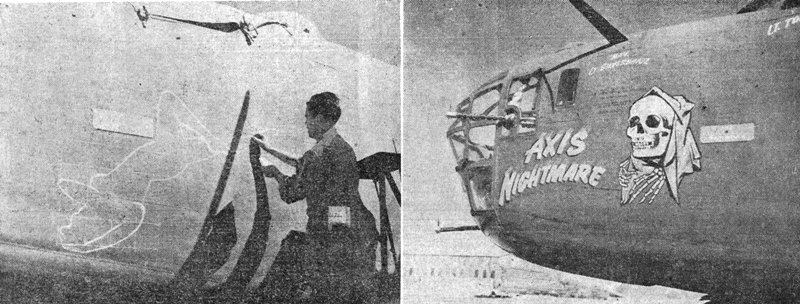
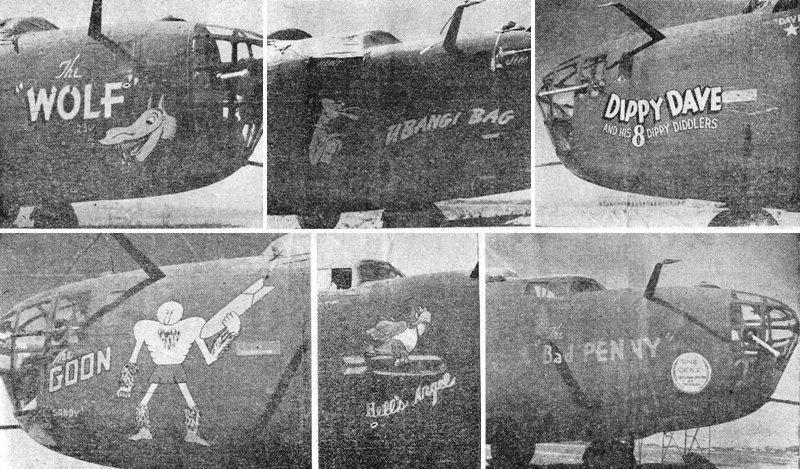
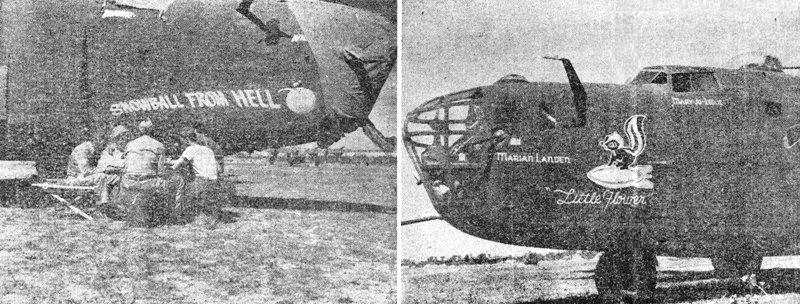
Indian Port Base Streamlines Unit Down To Seven Veterans
By SGT. JACK COE
WEST INDIA PORT - "It isn't what it used to be," seems the most apt term in attempting to describe the latest turn of events besetting this Air Force Replacement Center. Streamlining has pared the organization down to seven veterans, who remain as nucleus to handle the dwindling casual personnel and the "transient trade" which daily flows through, fluctuating more rapidly than water in a canal lock.
1st Sgt. Bill Studer, Personnel Sergeant Anthony Ciuffetelli, Mess Sergeant Freddy Bumgarner, Corp. Charley Henry, Corp. Gilba Kitchen, Louie Giardino and the writer in this veteran crew. Capt. David Brown is AFRC's new commanding officer.
Some of the "old guard" deserting us for the more prosaic security of Indian stone barracks, those who were in on the ground floor of AFRC's formation months ago at a nearby field - in the good old days of isolationism and contentment when American rations divided by mess sergeant, now W/O John S. Sabo, seemed as vital as a supply line to Russia - are Bill Hupp, Dan Davis, Earl Graham, Bob Kelly, Reuben Kirkam, Marvin Ailstock, Melvin Cassle, John Holmes, Harry Sagatis, Edgar Carey, Harold Frary, Sgt, Louis Ulanich and Corp. Merle Crossman.
SALMAGUNDI - Orders making Sgt. John Denbow a staff, issued last October in Florida, finally caught up to him this week. Denbow claimed he had been :sweating" for a long time and gave it up last month. Anyway, friends of the staff are jubilantly contemplating a big evening in town at the end of the month when the back pay comes due
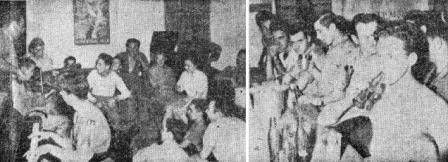 Musical-minded fellows at an India bomber base (left) give out with some G.I. jive to celebrate the opening of
their new service club. The demure miss is Red Cross representative Mildred Fisher. At the right, the fellows close
in on a bar. The stuff in the bottles in not real Coca-Cola.
Musical-minded fellows at an India bomber base (left) give out with some G.I. jive to celebrate the opening of
their new service club. The demure miss is Red Cross representative Mildred Fisher. At the right, the fellows close
in on a bar. The stuff in the bottles in not real Coca-Cola.
|
POINTIE-TALKIE LINGO TAUGHT AIRMEN
By PRESTON GLOVER Associated Press War Correspondent
CALCUTTA - American airmen operating in China are being taught to read Chinese with their fingers.
They have had to learn it that way because no matter how hard their teachers worked, they could not learn in a hurry how to speak Chinese so a Chinese could understand it. The new finger method is called the "pointie-talkie."
It works this way: An American airman is forced down some place in China, perhaps behind enemy lines. The natives are suspicious and afraid. So he smiles sweetly and pulls out his little pointie-talkie book and goes to work. There is one column of questions to ask, written in English. Opposite is the same thing in Chinese. So the airman points to the Chinese. The Chinese reads the question and naturally begins spouting the reply in Chinese. But the airman can't understand.
CHINESE MUST GET INTO THE GAME
However, below each question are several possible answers, printed both in English and Chinese. Which answer fits the question? Well, it is up to the American airman to persuade the Chinese to get into the game and select the right answer.
The first question in the book is aimed at solving all difficulties. It asks, "Is there someone here who can speak English? Will he come here?"
Then the next question is: "Shall I wait here for him or shall I go with you?"
Below these two questions are three possible answers. One is "No." A
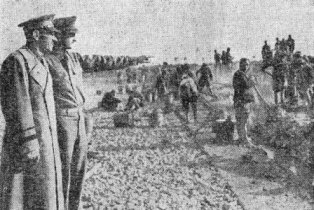 Maj. Gen. R. A. Wheeler (left), Theater SOS Chief, and Maj. Charles Price inspect new construction work at
an air base in China, where hundreds of Chinese coolies work from daybreak to sundown enlarging this and other
bases in China.
Maj. Gen. R. A. Wheeler (left), Theater SOS Chief, and Maj. Charles Price inspect new construction work at
an air base in China, where hundreds of Chinese coolies work from daybreak to sundown enlarging this and other
bases in China.
|
In case the answer starts out with a bad "no," then follow questions under several headings. For instance, one under food says:
"Please prepare for me rice, eggs."
Below it is a variety of answers, as "All right," "Sorry, I have none." "Please wait, I shall try to get some."
MAP REQUEST IS TOUGH ONE
Another note says "Please tell the nearest Guerillas or Chinese troops that I am here. Tell them secretly." The answers to that one are "All right" and "Don't know where they are."
These are samples of relatively simple ones. A really tough one says:
"Show me on any map you have where I am now."
The compiler of the book, John Davies, political advisor to Lt. Gen. Joseph W. Stilwell, said he didn't expect too much success from such tough ones as the last.
Of course, the whole thing hinges on two major factors. The airman must identify himself as an American. That is part of the pointie-talkie book. Flags are shown, and pictures of Chiang and Roosevelt. And finally, the airman must find somebody who reads Chinese. That's no snap job in China except in the cities. And most of the cities are occupied by Japanese.

in the home I left behind sweet Mother of mine In her favorite chair she's sitting, and she's rocking to and fro And she's praying God's protection be with me where'er I go Years have placed their mark upon her, Time has turned her hair to grey. The burdens of a world on her shoulders rest, placed by the sorrows of her day. Though her hands are worn with toil and task, and her step is not as spry, A saintly smile still wreaths her face and love still shines in her eye. God blessed the world when He made her, none other can take her place. For He gave to her His greatest gift, the beauty of His Love and Grace. And now while the world in madness strides, as war still stalks in the East, There's still one place in my mother's heart, where I'll always be in Peace. Lt. KEN HARRIS A place some of you've never seen. Where the buildings grow right up to the sky, And the grass is forever green. Where there's music, and love, and laughter. Where there's song and dancing and tears. Where a man can do just what he likes With no Nazi Gestapo fears. Where the West is still wild, in its own time anyway. And a man's best friend is a man Where friendship thrives, hospitality reigns, From every outstretched hand. Where you're a stranger once, and then You call everyone "Tom" or "Jack"; Your neighbor who met you only yesterday Will give you "the shirt off his back." Where they say "Hello" with a great big smile, And they mean it, every bit. You can go to a dance, and join in the fun. Not, because you're a stranger, just sit. Where a man is a man, and his eyes are as clear As the big blue sky up above him. Where his girl is a lovely thing to him. And she's mighty darn proud of him. Where a man can worship, can love, or say Just whatever he thinks is right. Where he can start from scratch, and be President, If he'll stay right in there and fight. I could write on and on of this heavenly place, But you wouldn't really understand Unless you had actually been there - To my home, my native land. But I'll go back some day, and I hope 'twill be soon. And altho I'll ne'er again roam I thank God for this war, 'cause to me it has proved That there's no other place like home. |
|
So Musolini, Hitler, and all you Axis guys If you think you can whip guys like me, With cowardly acts like Pearl Harbor, and Wake. Just keep right on trying, you'll see. We've too much to live for, and nothing to gain By giving our "Heaven" to Japs. We'll fight you to death, and as God is our judge, We'll wipe you right off the maps. So if you should want to buy a world globe Having mapped the isle of Japan. You had better hurry and buy it, my friend 'Cause the time's fast passing when you can! Sgt. AUBREY D. DICKEY And treat him kindly up there Give him the things he deserved Before he left down here. Instead of an Army cot Give him the softest bed Instead of the mosquito net Let the Angels fan his head. Instead of his parachute Give a pair of silver wings Please, dear Lord, substitute Many, many things. Instead of the Army mess Give him food for a king Take away all O.D. And let him do most anything. Let him have a dog in heaven And let him call her "Falps" For he loved that dog down here And she loved him, too, perhaps. Instead of identification tags Give him the keys of heaven That he may open wide the gates To welcome home all seven. Give him a golden crown And upon it "Hero" engrave But let him wear his uniform For he wore it like a man Yes, we are proud of his uniform For he died for Uncle Sam. Lt. MARY McHALE PAPER A sheet of paper It's nothing at all And strange it seems to me That anything So very small Could bring such ecstasy. But just your pen Within you hand Is the magic that's required To change something Dismissed offhand To something so desired. Lt. E. J. LIPSTEIN |
Awards of four Silver Stars for gallantry in action and 39 Air Medals for meritorious achievement while participating in aerial flight was announced by the 10th Air Force.
The Silver Stars were conferred upon 1st Lt. Robert H. Mooney, S/Sgts. Benjamin Ramirez and Morris A. Smith and Sgt. Melvin N. Grimes.
Those who received the Air Medal were:
1st Lt. Allan A. Lathan, 1st Lt. Clarence H. Suber, 2nd Lt. Charles V. Duncan, 2nd Lt. Howard R. Greene, 2nd Lt. John E. Thornton, M/Sgt. Ernest E. Lindley, T/Sgt. Gordon L. Grimm, S/Sgt. Roy W. Bullington, S/Sgt. John A. Coughlan, S/Sgt. Victor H. Elias, S/Sgt. Edward T. Friedman, S/Sgt. Harold L. McElroy, S/Sgt. Dwight L. Ralson, S/Sgt. William C. Roberts, Sgt. Joseph A. Cusman, 1st Lt. Charles J. Clarino, 1st Lt. Mason O. Brown, 1st Lt. Glee G. Smyth, T/Sgt. Sam J. McGlaughlin, Jr., S/Sgt. Patrick N. Boudreaux, S/Sgt. Samuel O. Koval, Col. Clinton D. Vincent, Capt. John F. Hamshire, Jr., 1st Lt. Joseph H. Griffen, 1st Lt. Charles J. Crysler, Maj. Paul C. Droz, Maj. Francis E. Brenner, Capt. Charles P. Simpson, 1st Lt. Charles D. Evans, 1st Lt. Loren D. Howie, 1st Lt. John F. Coonan, 1st Lt. John E. Fouts, Jr., 1st Lt. Earl C. Bishop, Jr., 1st Lt. Vernon Ellifritz, 1st Lt. Fred C. Huffman, 2nd Lt. William R. Rodgers, 2nd Lt. Charles F. Wilson, Capt. Bert M. Carleton, and S/Sgt. Ira J. Juntz.
HEROIC NURSE WINS AIR MEDAL AWARD
LOUISVILLE, KY. - The story of a heroic seven-day flight from India to Washington was revealed here when an American nurse became the first woman to receive a U.S. Air Medal.
Second Lt. Elsie S. Ott, of Long Island, N.Y., 29-year-old air evacuation nurse of the First Troop Carrier Command, received the award at presentation ceremonies at an air base near here. The woman lieutenant was cited for nursing five seriously-ill officers and soldiers on the long air trip.
She was serving at a hospital in India when called upon to make the flight. She told reporters, "I was the envy of all the other nurses."
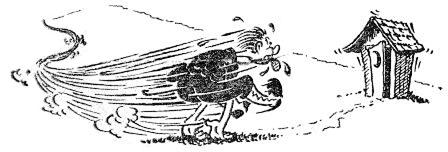
WITH AN AMEBA
If you get plain ordinary dysentery, you're in training for that USC track team. But if you waltz with an ameba, you've got amebic dysentery and then, brother, you are definitely in one hell of a shape!
The disease comes from a couple of cute youngsters called "dysentery bacilli" and "amebic hystolica." You'll find them all over the place like a herd of sheep.
These kids live in improperly washed vegetables and crockery and particularly enjoy cozy little corners like the cracks in Ram Lahl's best china. They also ride about (on passes) in human carriers, revel in contaminated milk products, and hold field days in bazaars and sidewalk food wagons. You'll even find them in contaminated drinking water.
It seems a little silly to tell you about the symptoms as nobody has ever missed them yet.
Briefly, however, you'll get a belly-ache, put your cakes, pass blood and mucous, have fever and possibly chills and show marked weakness. Maj. L. C. Bevil, Assistant Theater Surgeon, adds this masterful piece of understatement:
"You'll have loose bowels!"
Chum, you'll make so many trips to your local latrine that you'll wear a path six inches deep in a concrete runway!
If you want to avoid this business, do the following: (1) Eat and drink only in places approved by Army authorities - find out in other words, where the medics belly-up for those Scotch and sodas. (2) Throw your chipped plates at your mess sergeant. (3) If you can trace pictures on your plates or cooking utensils, start a fast. (4) Don't eat vegetables or fruits raw unless they've had the old permanganate treatment or a reasonable facsimile thereof.
Dysentery should not be confused with ordinary diarrhea which is commonly referred to as Gippy Tummy, Delhi Belly, Karachi Krud, or simply, the G.I.'s. In treating dysentery, "His Nibs" has this to say:
"Sulfonamide drugs are the mainstay in the treatment of bacillary dysentery. For treatment of amebic dysentery several entirely different drugs are used."
Sounds ominous, doesn't it?
|
CENSORED
An official letter on mail censorship came out a while back which you all have undoubtedly read with somewhat more than academic interest. It embodies 24 "don'ts" which caused one wag to remark:
"It's the greatest thing that ever happened to me. Now I'll never have to write a letter home and the folks can't complain because there is nothing I can write about."
The Roundup, feeling that American motherland may suffer from this censorship policy, offers a form letter in which all the "don'ts" are observed.
Dear Mom:
I'd like to tell you what I did last night but the mail censor says that I can't give any dates other than the one at the top of this letter. This seems sort of funny as I always had dates at home and nobody seemed to think anything about it although it was often wise not to put anything about them in writing.
I've always wanted to send you some pictures of our barracks here but that is not allowed. I've also wanted to send some pictures of some of the mosques and temples but that is also not allowed. I think, however, that you might see pictures of our barracks in a future issue of LifeLife photographer, took some a while back which the military censors feel will not give as much comfort to the enemy as those I wanted to send you. That seems sort of funny to me because his pictures were very clear and mine were fogged.
Here in India we have a lot of carts pulled by bullocks and camels. In China there are the rickshaws. I'd like to tell you all about them but the censor says we can't discuss the quality of rolling stock. He may mean just trains when he says that, but I'm taking no chances.
I'd like to tell you all about my commanding general but we aren't supposed to mention the names of ranking officers. Darrell Berrigan of the United Press, and Preston Grover, of the Associated Press, however, wrote some long stories about him the other day and mentioned his name several times, I understand, and you may have read the stories. His initials are J.W.S. and he has a couple of very corny nicknames. Also he always wears an old campaign hat with a shoestring to hold it on. I think also that 90 percent of his higher ranking subordinate officers have now gotten their names in the papers, so, if you have been saving clippings, I'll tell you something about them all when the war is over.
I haven't written for a long time because way out here in the weeds we ran out of ink and we're not supposed to write in pencil. Also I've got to keep this short because we can't write on both sides of the paper and we have a paper shortage.
I'd like to tell you some of the towns we visited on the way over here but I can't. If you are really curious, however, take a trip to the Pan American Airways depot in New York. When I left our whole route was traced in red neon tubes on a map about as big as the side of your house.
I'll have to leave off the "X's" and "O's" but
I love you,
Stinky
The C.B.I. Roundup is a weekly newspaper published by and for the men of the United States Army Forces in China, Burma, and India, from news and pictures supplied by staff members, soldier correspondents, the United Press, and the War Department. The Roundup is published Thursday of each week and is printed by The Statesman in New Delhi, India. Editorial matter should be sent directly to Lt. Floyd Walter, Rear Echelon Hq., U.S.A.F., C.B.I., New Delhi, and should arrive not later than Monday in order to make that week's issue. Pictures must arrive by Sunday and must be negatives or enlargements. Stories should contain full name and organization of sender.

APRIL 1, 1943
Adapted from the original issue of C.B.I. Roundup
Copyright © 2015 Carl Warren Weidenburner
TOP OF PAGE PRINT THIS PAGE ABOUT THIS PAGE SEND COMMENTS
PREVIOUS ISSUE CLOSE THIS WINDOW NEXT ISSUE
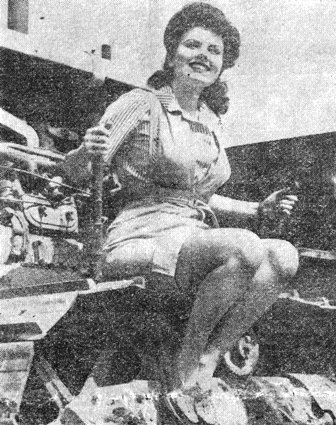 War requires a lot of food; production of food calls for many men; the Army, Navy and war factories also need
manpower, so women are being encouraged to do farm work. Sheila Ryan's Hollywood press agent used that as an excuse
to send us this picture and he said that she knew all about farm work, including how to run a tractor.
War requires a lot of food; production of food calls for many men; the Army, Navy and war factories also need
manpower, so women are being encouraged to do farm work. Sheila Ryan's Hollywood press agent used that as an excuse
to send us this picture and he said that she knew all about farm work, including how to run a tractor.
